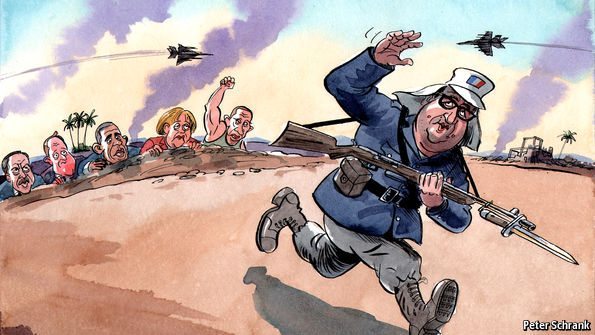Coalition of the grudging
Some support for Mr Hollande, who has tripled France’s air-strike capacity in the region, is already on its way. Britain’s David Cameron says he will ask Parliament to authorise air strikes on Syria. Mr Obama has pledged closer sharing of intelligence for target-selection, and an intensification of attacks on IS. Yet Mr Hollande’s ambition is greater: he has said that he hopes to put together a “unique coalition” to fight IS, drawing Russia onside, and to bring Europe into the war, too.
On the first count, the French president has had to scale back talk of a formal coalition. But he is still hoping to find common ground with the Russians, themselves outraged by the deaths of 224 Russians on a flight over Egypt that was bombed last month. France, which only this year cancelled the sale of two Mistral-class warships to Russia, sees an unusual opportunity now to wage common war on IS. The French talk of “annihilating” the terrorist group. The Russians speak of hunting them down “at any point on the planet”. To that end, Russia ordered its warships to share information about positions with the approaching Charles de Gaulle, in a spirit of co-operation.
Crowded skies
The risks of multiple unco-ordinated combat operations over Syria were underlined on November 24th, when Turkey shot down a Russian fighter jet (see article). Yet the diplomatic challenge of resolving this is great, not least because of the gap between America, which regards Mr Assad as the problem, and Russia, which calls him a bulwark against IS. France too has long insisted on Mr Assad’s departure. But it now wants to make the immediate common priority the fight against IS.
In the short run, France may have a better chance of winning European support. It has already invoked an EU mutual-defence clause. Besides the possible British air strikes, France may secure aerial intelligence from Germany. Its operations elsewhere may get help too. One of only two muscular military powers in Europe, France has been unusually willing to intervene abroad, partly because public opinion has not been scarred by misadventure in Iraq. Now it could be relieved in places such as Mali, where France has some 1,000 troops, and where terrorists murdered at least 20 hostages in a hotel last week. Germany may send 650 soldiers to Mali.
Read More: Coalition of the grudging | The Economist

